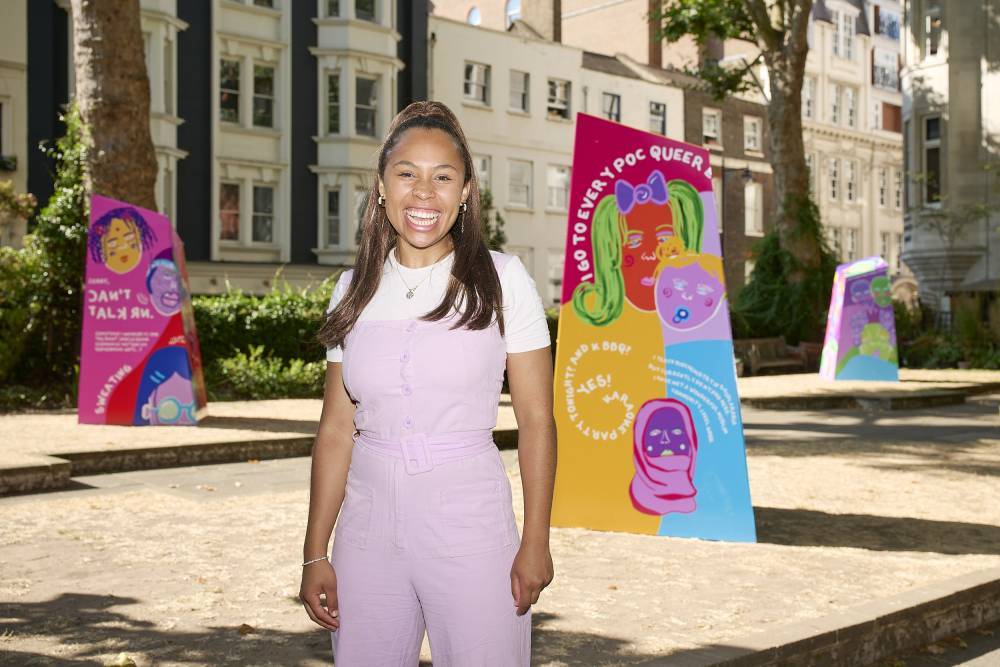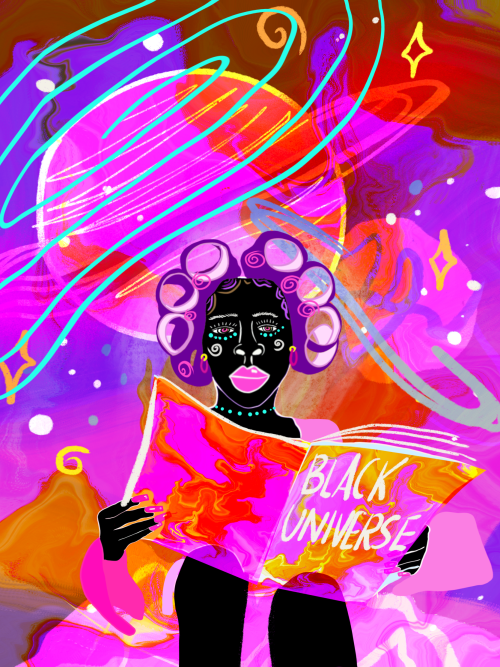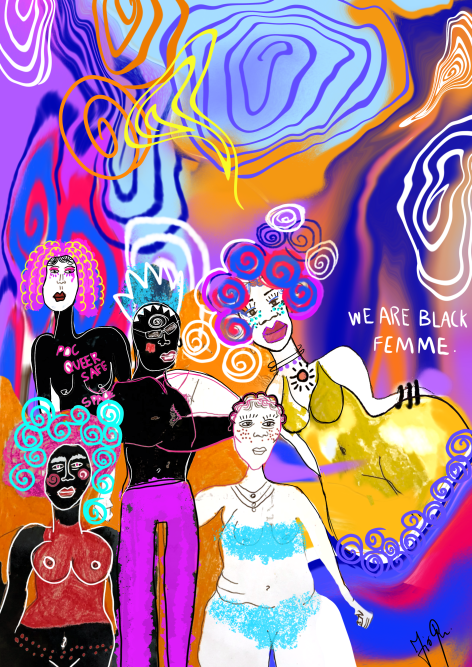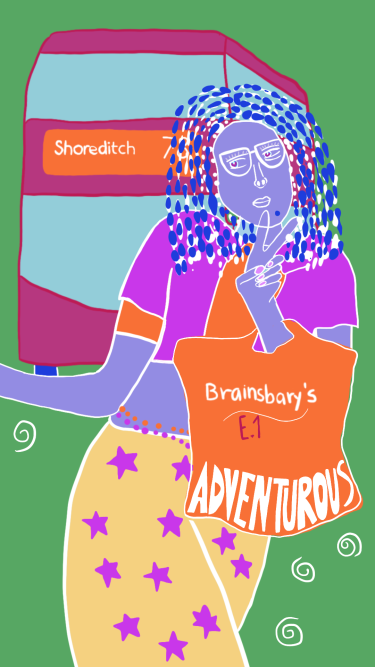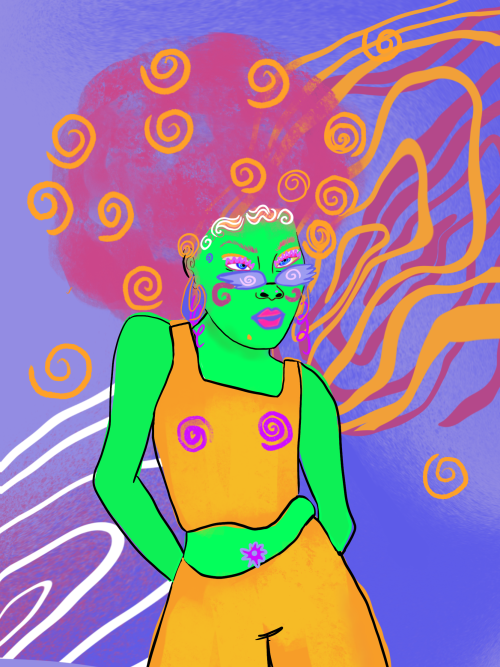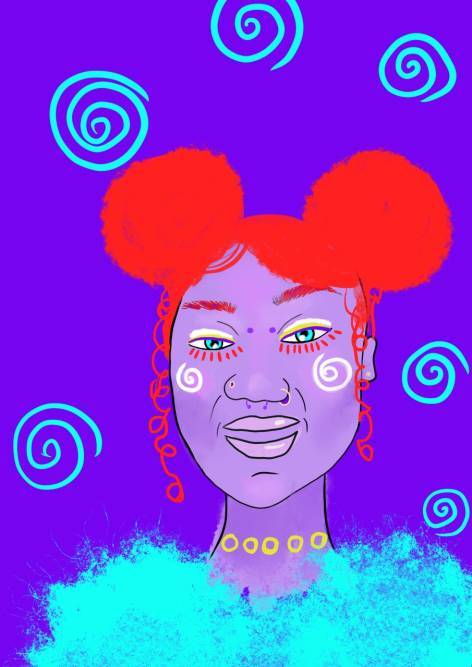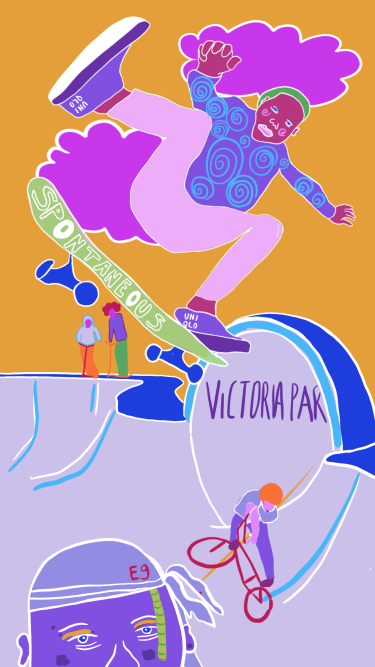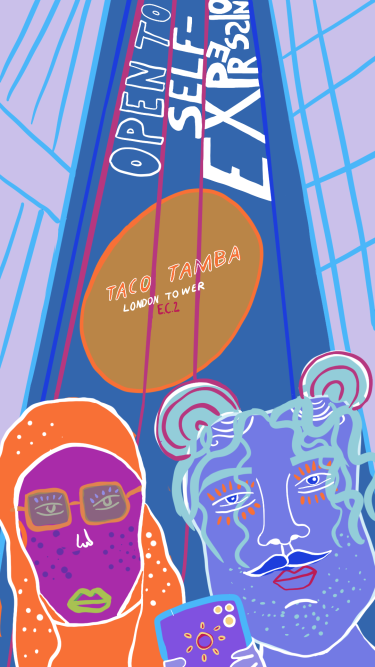Freelance illustrator and advertising student Fiona Quadri on finding her unique voice

Article by: Gaynor Orvis
Publication date:Fiona Quadri studied on Ravensbourne’s Foundation course in Fashion Promotion, before going on to study on the BA (Hons) Advertising and Brand Design course. She is now in her third year and due to graduate in December 2022.
While in her final year at Ravensbourne, Fiona was awarded a place within SEEDS, Ravensbourne's Self Employment Entrepreneurship Diversity Scheme. SEEDS is designed to support the natural enterprise skills of Ravensbourne's dyslexic, neurodivergent students and those from diverse backgrounds in setting up their own business or freelance career.
With guidance and support from the team at SEEDS, she has been able to build the skills and confidence to thrive as a freelancer and build her own unique practice in illustrative image making.
In her work, Fiona addresses identity and race within BIPOC queer communities and aims to give voice to marginalised communities and break down stereotypes.
We caught up with Fiona to discuss how her experience with SEEDS helped her flourish, her unique style, and her dreams for the future.
hide
How did you become involved with SEEDS initially?
I had a friend that spoke a lot about SEEDS and recommended the programme to me. It sounded like a really uplifting community and I was inspired.
I got in touch with Yvonne, the organiser of SEEDS, and she was very supportive. I wrote my application and started last September.
Can you explain some of the benefits of getting involved with SEEDS for you personally?
I found SEEDS really helpful, because it taught me a lot of things that I’d never learnt on my course. For example, we had dedicated classes about setting up as a freelancer and taxes and how to write invoices. We got the chance to speak about things like contracts and agreements. I never knew about my rights as an artist before SEEDS.
Additionally, I learnt how to organise myself financially, as well as how to balance life and work in general.
It was so beneficial to be part of a community of like-minded people. I got to know people from different courses and felt really inspired by everyone else's individual practices.
Did you have a mentor as part of SEEDS?
Yes, Abi Meats was my mentor. She owns her own company called This is Rude. She and her husband Rupert co-own it and they have a shop ‘Everyday Sunshine’ in Stoke Newington where they sell their prints.
Alongside that, they also do freelance work. She’s worked with some massive brands like Apple and they’ve recently done a big advertising project with Bassets.
For me, working with Abi was a signal of hope. She showed me that there are things I can do with my art, and avenues I can pursue that I didn’t feel I could on my course. She taught me that I don’t have to pigeonhole myself.
I always felt like my practice was a little different from others on my course, because I had come from a fine art and fashion background. Abi showed me that I could stick with my own style. She showed me that it was possible to be as creative as I wanted and still find meaningful, fulfilling work. Because of her, I discovered that there were other options than going to work in a studio, which I wasn’t sure I wanted to do.
hide
Are you still in touch with your mentor now?
Yes, I recently went to visit her in her shop. I also have regular meetings with her. Even though I’ve completed my work with SEEDS, I still have a great connection with my mentor.
We’ve been talking about collaborating on something together, so that’s really exciting. It feels more like a friendship now. I still look up to her as a mentor, but she always says that there are things I can teach her as well, so it’s a two-way relationship.
Do you feel SEEDS has helped you pursue your career goals?
As I’m still so early in my career, and only just graduating this year, I’m still working out what my career goals are.
I've recently been awarded a place within Incubation, a collaborative space within Ravensbourne's new Institute for Design and Creativity.
SEEDS helped me prep for the pitch for Incubation. I'd like to thank Charles on the SEEDS programme, he really helped me to structure my words. This means that I’ll be able to work in the space and share it with so many other fantastic creatives.
In terms of my career, I'm still not sure what my ultimate end goal is, but I want to develop the idea of creating my own brand as a creative. I want to be able to do freelance work and facilitate workshops under my own synonymous brand name.
Can you tell us a bit about what you've been working on lately?
During the summer, I was freelancing full time, and I had the opportunity to work on an installation in the centre of London. The programme I worked with was called Brighter Futures and is funded by Art of London, which basically is the organisation that takes care of everything around Piccadilly in terms of screenings, art installations and events.
That was a really fun experience, and I was able to meet a lot of really interesting industry people. What I enjoyed about this work was that it gave me the full freedom to experiment.
This was another sort of stamp of approval that my style of work is accepted, and again, it was because of my experience with SEEDS that I had the confidence to explore this.
I’m also about to start my master’s course in a week, which is focusing on our so-called post-colonialist society. I’ll learn a lot of historical theories. It looks at how we can dismantle racial injustice and the role the empire played in the past.
The freelance work I do always aligns with my core values of striving for equality and a better future. I’m hoping that my masters will help inform my work in that sense, as I can feed in a more historical perspective.
Can you describe a bit about your own personal creative style?
I think my style is quite colourful. As I mentioned, I came from a fine art background and then studied fashion promotion on my foundation course.
We did a very wide variety of activities on the foundation course, including illustration, but the focus was from a fashion promotion point of view.
Fashion illustration is known to be quite fast, because people illustrate while the models are on the catwalk. It usually entails quickly outlining some details and adding some colour splashes. I think that’s where my style originated from.
I’ve tended to keep that style and develop it. From there, I started to experiment with digital drawing. The advertising course pushed me to develop my digital skills too.
Also, my work is rooted in heritage and culture. I grew up in a household where we had a lot of Nigerian artwork and Nigerian sculptures around, that heavily influenced my work too.
A really important part of my work is helping to uplift marginalised communities. I want to be able to use my work to tell the stories of the spaces I navigate such as the black and queer communities. It’s really important for me to help enable these voices to be heard.
What have you been working on as a freelancer?
I think my freelance stuff really took off because I was surrounded by so many great creatives.
In the past, I’ve worked on stuff with Lewisham Council. I was working with a shop owner in New Cross, and we collaborated on a poster series that was about uplifting black-owned businesses.
At the moment I’m busy getting ready to start my masters, and I’m also doing some work for London Design Festival. I’ve been painting a piece that is exhibiting there.
Finally, what does your dream job look like?
This is a question I’ve been thinking about a lot over the summer. Projecting myself into the future, I think my ultimate goal is to develop my brand, as Fiona Quadri – so something that is really true to me.
I think ultimately, I would like to succeed with my mixed media art style and continue facilitating workshops. I hope that my studies on my masters will feed into this, with the historical knowledge I’m acquiring through reading.
I would also love the opportunity for my work to enable me to travel the world. I’d like to work for myself and manage my own time.

